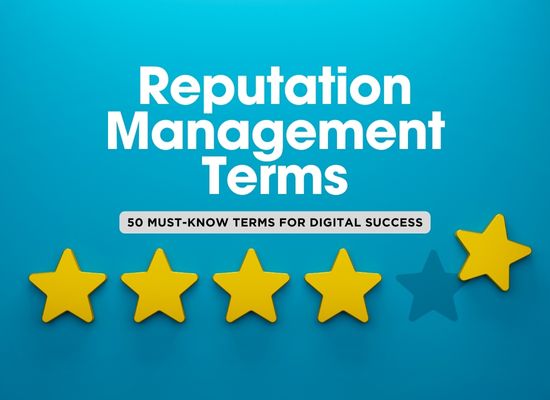Managing your reputation online is crucial in today’s digital-first world, where a single negative comment can go viral in moments. Whether you’re an individual or a business, understanding the key terms in reputation management is the first step to safeguarding your image. These terms will help you navigate the strategies, tools, and concepts essential to building and maintaining a positive reputation.
🖥️ #1 – Online Reputation
Definition: The perception of a person or business online.
Why It Matters: Your online reputation influences public trust and customer decisions.
Example: Positive Google reviews can boost your brand’s credibility, while a string of negative comments might deter potential customers.
🛠️ #2 – Reputation Score
Definition: A numerical rating that reflects your online reputation.
Why It Matters: It provides a measurable way to track how others view your brand.
Example: Tools like MyLife or Reputation.com calculate scores based on social media, reviews, and public data.
🔎 #3 – Search Engine Reputation Management (SERM)
Definition: Strategies to control search engine results for your name or brand.
Why It Matters: Ensures that positive content appears prominently in search results.
Example: Publishing blog posts or press releases to outrank negative articles.
🌟 #4 – Brand Monitoring
Definition: Tracking mentions of your brand across the internet.
Why It Matters: Helps you identify and respond to both positive and negative mentions.
Example: Tools like Google Alerts or Mention can notify you when your brand is mentioned online.
📝 #5 – Review Management
Definition: The process of handling online reviews to shape your brand’s perception.
Why It Matters: Reviews heavily influence consumer trust and purchasing decisions.
Example: Responding promptly to negative reviews on Yelp or Google to show you care about customer feedback.
📱 #6 – Social Listening
Definition: Monitoring social media channels for mentions of your brand or keywords.
Why It Matters: Helps you understand public sentiment and engage with your audience.
Example: Using tools like Hootsuite or Sprout Social to track brand-related conversations.
🛡️ #7 – Crisis Management
Definition: Actions taken to manage a PR crisis or reputational damage.
Why It Matters: A well-executed plan can mitigate harm and restore trust.
Example: A company issuing a public apology and corrective action after a data breach.
💬 #8 – Sentiment Analysis
Definition: Evaluating the tone of online mentions—positive, neutral, or negative.
Why It Matters: Helps you understand how people feel about your brand.
Example: Analyzing customer tweets to gauge satisfaction with a product launch.
🚀 #9 – Content Suppression
Definition: Techniques to push negative or unwanted content down in search results.
Why It Matters: Keeps damaging content less visible to the public.
Example: Publishing new positive articles, blogs, or videos to bury outdated criticism.
🌐 #10 – Reputation Marketing
Definition: Using a positive reputation as a key marketing asset.
Why It Matters: Enhances customer trust and boosts conversions.
Example: Highlighting 5-star reviews and testimonials in your ads and website.
🧰 #11 – Reputation Repair
Definition: The process of rebuilding trust after reputational damage.
Why It Matters: Essential for recovering from negative incidents that impact your brand.
Example: A business offering discounts and improved services after negative feedback.
🌐 #12 – Domain Authority (DA)
Definition: A ranking score that predicts a website’s ability to rank in search engines.
Why It Matters: High DA means your content is more likely to rank above negative results.
Example: Improving your DA by earning backlinks from authoritative sites.
💡 #13 – Personal Branding
Definition: Crafting and promoting an individual’s reputation and identity online.
Why It Matters: Personal branding builds credibility and trust in your professional sphere.
Example: Creating a polished LinkedIn profile to showcase expertise and accomplishments.
🔗 #14 – Backlinking
Definition: Links from other websites that lead to your content.
Why It Matters: Backlinks improve your search engine ranking and visibility.
Example: Writing guest blogs to earn backlinks from high-authority websites.
📉 #15 – Negative SEO
Definition: Malicious strategies aimed at damaging a competitor’s search engine ranking.
Why It Matters: Awareness helps protect your brand from these unethical practices.
Example: Identifying and disavowing spammy backlinks targeting your website.
💻 #16 – Digital Footprint
Definition: The trail of data you leave online through your activities.
Why It Matters: Every action—posts, comments, or interactions—affects your reputation.
Example: Deleting old social media posts that no longer align with your current image.
🛑 #17 – Defamation
Definition: False statements that harm a person’s or company’s reputation.
Why It Matters: Understanding defamation laws helps protect against unfair attacks.
Example: Filing a lawsuit against someone spreading false, damaging claims online.
💻 #18 – SEO Optimization for Reputation
Definition: Using search engine optimization (SEO) to improve positive content rankings.
Why It Matters: Helps ensure that favorable content outranks negative mentions.
Example: Optimizing your company blog posts with keywords and metadata.
📊 #19 – Review Aggregation
Definition: Collecting and displaying reviews from multiple platforms in one place.
Why It Matters: Simplifies the process for customers to see your overall reputation.
Example: Using widgets to display Google, Yelp, and Facebook reviews on your website.
🔍 #20 – Transparency
Definition: Being open and honest with stakeholders about your actions and policies.
Why It Matters: Transparency builds trust and mitigates the impact of negative events.
Example: A company publicly admitting to a mistake and explaining corrective measures.
📣 #21 – Social Proof
Definition: Using testimonials, reviews, or endorsements to build credibility.
Why It Matters: Potential customers are more likely to trust others’ experiences.
Example: Featuring 5-star customer reviews prominently on your website or social media.
🔒 #22 – Privacy Management
Definition: Safeguarding personal or business information online.
Why It Matters: Prevents sensitive information from being exploited to harm your reputation.
Example: Using privacy settings on social media platforms to limit public access.
🧑⚖️ #23 – Reputation Legal Services
Definition: Legal actions taken to protect or restore your reputation.
Why It Matters: Ensures that false claims or defamatory content can be addressed effectively.
Example: Hiring a lawyer to issue a cease-and-desist letter to someone spreading false claims.
📦 #24 – Content Creation
Definition: Producing positive and engaging material to enhance your image.
Why It Matters: Fresh content helps push down negative mentions in search results.
Example: Writing articles, blogs, or creating videos that showcase your expertise.
🔥 #25 – Negative Review Response
Definition: Crafting thoughtful replies to unfavorable reviews.
Why It Matters: Proper responses can minimize damage and show professionalism.
Example: Apologizing to a dissatisfied customer and offering to resolve the issue.
💼 #26 – Corporate Social Responsibility (CSR)
Definition: Demonstrating ethical and sustainable practices to improve public perception.
Why It Matters: Positive CSR efforts enhance brand reputation and attract supportive customers.
Example: Donating a portion of profits to environmental or social causes.
🎯 #27 – Reputation Metrics
Definition: Measurable indicators of your brand’s reputation health.
Why It Matters: Tracking metrics helps identify strengths and areas for improvement.
Example: Monitoring your Net Promoter Score (NPS) or customer sentiment.
📤 #28 – Proactive Outreach
Definition: Taking preemptive steps to build goodwill before issues arise.
Why It Matters: Strengthens relationships and builds a buffer against future negativity.
Example: Engaging with your audience through newsletters or social media Q&As.
📧 #29 – Email Reputation Management
Definition: Ensuring your email communications align with your reputation goals.
Why It Matters: Spammy or poorly written emails can damage trust.
Example: Maintaining a professional tone in customer service or marketing emails.
📆 #30 – Crisis Communication Plan
Definition: A prepared strategy for responding to reputation crises.
Why It Matters: Quick, thoughtful responses can minimize long-term damage.
Example: Having a pre-drafted apology template ready for potential PR issues.
💬 #31 – Brand Advocacy
Definition: Encouraging customers or employees to promote your brand.
Why It Matters: Advocates amplify positive sentiment and attract new audiences.
Example: Motivating loyal customers to share their experiences on social media.
📉 #32 – Reputation Risk
Definition: The potential for actions or events to harm your reputation.
Why It Matters: Identifying risks helps prevent crises before they escalate.
Example: Monitoring employee conduct to avoid scandals that could tarnish your image.
📄 #33 – Media Monitoring
Definition: Tracking news outlets for mentions of your brand or key topics.
Why It Matters: Helps identify public narratives and respond proactively.
Example: Using tools like Meltwater or Cision to monitor articles about your business.
🛡️ #34 – Defensive SEO
Definition: SEO strategies aimed at protecting your brand from negative content.
Why It Matters: Helps push harmful content lower in search rankings.
Example: Publishing keyword-rich blog posts to maintain dominance over search results.
🧠 #35 – Perception Management
Definition: Efforts to influence how others view your brand or identity.
Why It Matters: Positive perceptions enhance trust and long-term loyalty.
Example: Sharing stories of community involvement to showcase a socially responsible image.
🔍 #36 – Online Crisis Management
Definition: Addressing negative events or feedback that appear online.
Why It Matters: Swift actions can prevent a reputation crisis from spiraling out of control.
Example: Responding to a viral complaint on Twitter with an immediate solution.
🌟 #37 – Executive Branding
Definition: Building and managing the online reputation of key company leaders.
Why It Matters: A respected leader enhances the organization’s overall reputation.
Example: Creating LinkedIn articles authored by executives to establish thought leadership.
📣 #38 – Social Media Reputation
Definition: Managing how your brand is perceived on social platforms.
Why It Matters: Social media is often the first place customers voice their opinions.
Example: Maintaining a positive and professional presence on platforms like Twitter or Instagram.
💡 #39 – Thought Leadership
Definition: Positioning yourself or your brand as an industry authority.
Why It Matters: Builds trust and enhances your reputation as a credible source.
Example: Publishing insightful articles or whitepapers on trending topics in your field.
🔗 #40 – Link Building
Definition: Acquiring quality backlinks to improve your website’s search rankings.
Why It Matters: Higher rankings push negative content down the search results.
Example: Partnering with reputable blogs or news outlets to feature your brand.
🌐 #41 – Reputation Dashboard
Definition: A centralized tool to monitor and manage reputation metrics.
Why It Matters: Provides a clear overview of your reputation health.
Example: Platforms like Reputation.com offer dashboards that track reviews, sentiment, and mentions.
🔔 #42 – Alert Systems
Definition: Notifications for mentions or changes in online reputation.
Why It Matters: Allows immediate responses to potential issues.
Example: Setting up Google Alerts for your business name or products.
🗳️ #43 – Public Sentiment
Definition: The overall attitude or perception of your brand among the public.
Why It Matters: Positive sentiment fosters trust, while negative sentiment requires mitigation.
Example: Tracking sentiment analysis of customer feedback using AI tools.
📈 #44 – Reputation Growth
Definition: Strategies aimed at improving and expanding positive recognition.
Why It Matters: Builds long-term trust and credibility.
Example: Running campaigns that highlight achievements or positive milestones.
📜 #45 – Transparency Reports
Definition: Publicly shared reports on a company’s actions or practices.
Why It Matters: Transparency builds consumer trust and reduces skepticism.
Example: Releasing annual reports on sustainability efforts or charitable contributions.
⚖️ #46 – Ethical Marketing
Definition: Honest and responsible marketing practices that align with brand values.
Why It Matters: Enhances trust and prevents backlash from misleading claims.
Example: Promoting only verified claims in advertising campaigns.
🌟 #47 – Customer Advocacy Programs
Definition: Formal programs encouraging customers to share positive experiences.
Why It Matters: Turns satisfied customers into reputation-building ambassadors.
Example: Offering rewards for referrals or testimonials.
💼 #48 – Competitive Reputation Analysis
Definition: Evaluating competitors’ reputations to identify strengths and weaknesses.
Why It Matters: Helps position your brand more effectively in the market.
Example: Analyzing competitor reviews to differentiate your offerings.
🧩 #49 – Reputation Repair Campaigns
Definition: Coordinated efforts to recover from significant reputation damage.
Why It Matters: Restores trust and credibility after crises.
Example: Rebranding and launching community-focused initiatives after a scandal.
🔗 #50 – Influencer Reputation
Definition: Leveraging influencers to shape public perception of your brand.
Why It Matters: Influencers can rapidly amplify both positive and negative narratives.
Example: Partnering with reputable influencers for product endorsements.
Reputation management is a multifaceted process that requires constant vigilance and adaptability. By understanding these key terms, you can navigate the complexities of building, maintaining, and repairing your reputation with confidence. Whether you’re an individual or a business, investing in reputation management pays dividends in trust, loyalty, and long-term success. 🌟



